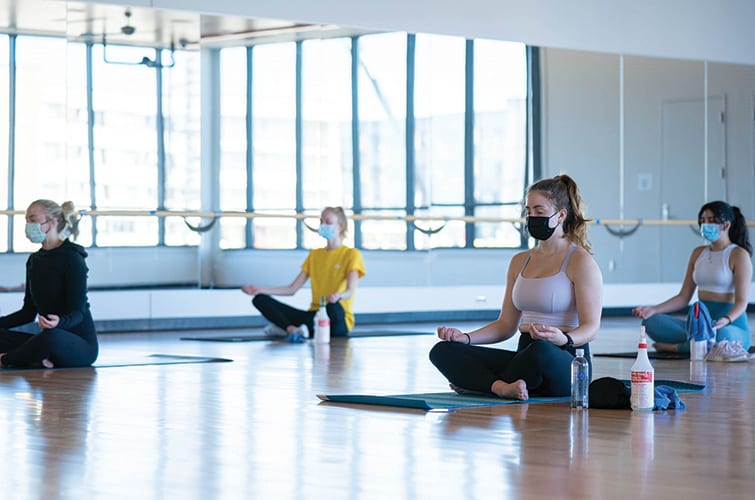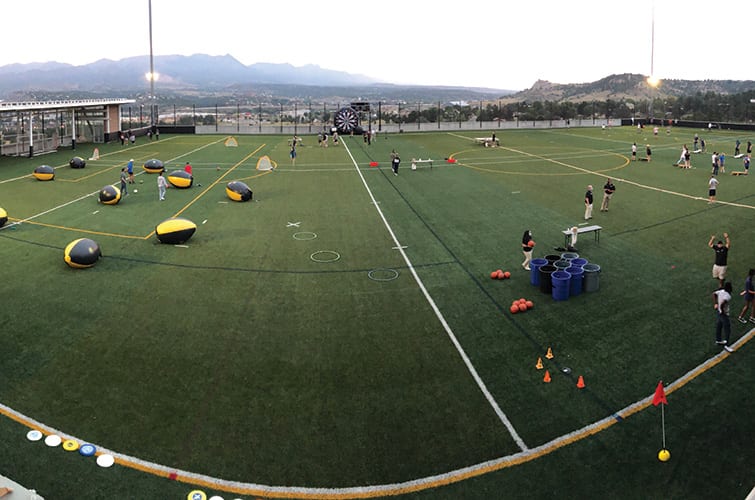The COVID-19 pandemic created a historic challenge for the campus recreation industry. From coast to coast, departments closed their doors for months to a year. Campus rec pivoted to virtual programming, and unfortunately, faced a number of staff layoffs and furloughs. In all of these changes and more, the industry continues to face an even bigger challenge: the mental health crisis.
Skyler Rorabaugh, the director of Campus Recreation at the University of Colorado Colorado Springs (UCCS), described the challenges his campus community faced during 2020, stating students, faculty and staff resources were diminished not only in capacity but quantity as well.
“We furloughed multiple professional staff members in the summer of 2020,” said Rorabaugh. “Our campus housing moved out over 1,700 students, leaving only 22 remaining through the summer of 2020. With our facilities closed, in-person engagement was null amidst growing feelings of isolation.”
Rorabaugh elaborated even though the UCCS student population dropped, the demand for mental health services did not. “Our mental health services began to experience a new kind of student profile for appointments,” he said. “Twenty-three percent of overall mental health service appointments were related to crisis. Thirty-four percent more students were seen for crisis appointments in 2020-2021 versus 2019-2020. Typically, the largest portion of care referrals during any given year are mental health concerns, not crisis.”
Meeting New Mental Health Crisis Demands
So, in understanding these new demands, the UCCS campus rec team sprang into action. They created reopening and recovery plans to address their campus needs. At the top of the list was to provide students virtual and in-person access for recreation and overall wellness.
“A survey was compiled that was distributed to all residential life students in the fall of 2020 to best understand how we could evolve our facilities, programs and services to address their concerns,” said Rorabaugh. “We also partnered with our director of Mental Health Services and director of Health Services to record a video that was distributed to all residential life students explaining the health and safety protocols being utilized within our facilities, programming and services to create a safe recreation environment for student participation.”
In addition to partnering with Mental Health Services, UCCS loaned equipment to their public safety department. Plus, UCCS continues to partner with the Dean of Students Office food pantry program. Together, they distribute items to students in need of a food resource. Most recently, the UCCS recreation center served as a “point of dispensing” for COVID-19 vaccinations for all student-facing faculty and staff. They administered over 500 vaccines with the support of over 100 volunteers.
Shawn Phippen, the director of Campus Recreation at Valdosta State University, said his team also worked with campus partners to help reach more students. “We worked with our Counseling and Wellness departments to support a number of events like Coffee Talks and education presentations on exercise, the immune system and nutrition,” he said. “We always work with our Counseling and Wellness departments, but during this time, these partnerships have been even more important.”
The Power of Socialization and Partnerships
One of the biggest things Phippen and his team heard students say they were missing the most was team sports. “Our team worked really hard with the COVID task force on campus to get flag football and basketball approved with modifications,” said Phippen. “In December 2020, the plan was approved. We completed Flag Football at the start of spring and started basketball next. Students were extremely excited to have the opportunity to participate in team sports again.”
Aligned with having team sport participation available once more, Aaron Hobson, the director of Recreation and Wellbeing at the University of Wisconsin-Madison (UW-Madison), said students are craving in-person socialization. As such, his team focuses on creating safe opportunities for students to connect in-person within the next year.
To best create these opportunities, the UW-Madison team is also strengthening relationships with campus partners. “This includes building a formal referral process to help remove barriers for students,” said Hobson. “We also increased our well-being workshop offerings to include topics around resiliency and social justice, with support from campus partners.”
When discussing the mental health crisis with partners, Hobson suggested removing terms such as “ownership of programs or services” from the conversation. This allows for more collaborative discussions and create a larger impact on students.
“Recreation and well-being departments can play a key role in helping to increase access to mental health support through nonclinical services,” said Hobson. “But remember, we are just one piece of the puzzle when it comes to the mental health crisis among students. It will take a collaborative effort to create long-lasting, positive change.”












